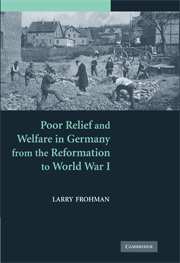Book contents
- Frontmatter
- Contents
- List of Tables and Figure
- Acknowledgments
- Introduction
- 1 Discipline, Community, and the Sixteenth-Century Origins of Modern Poor Relief
- 2 The Rise and Fall of the Workhouse: Poor Relief in the Age of Absolutism
- 3 Pauperism, Moral Reform, and Visions of Civil Society, 1800–1870
- 4 The State, the Market, and the Organization of Poor Relief, 1830–1870
- 5 The Assistantial Double Helix: Poor Relief, Social Insurance, and the Political Economy of Poor Law Reform
- 6 New Voices: Citizenship, Social Reform, and the Origins of Modern Social Work in Imperial Germany
- 7 The Social Perspective on Poverty and the Origins of Modern Social Welfare
- 8 From Fault to Risk: Changing Strategies of Assistance to the Jobless in Imperial Germany
- 9 Youth Welfare and the Political Alchemy of Juvenile Justice
- 10 The Social Evolution of Poor Relief, the Crisis of Voluntarism, and the Limits of Progressive Social Reform
- 11 Family, Welfare, and (Dis)order on the Home Front
- 12 Wartime Youth Welfare and the Progressive Refiguring of the Social Contract
- Conclusion: The End of Poor Relief and the Invention of Welfare
- Sources and Abbreviations
- Index
- References
11 - Family, Welfare, and (Dis)order on the Home Front
Published online by Cambridge University Press: 17 July 2009
- Frontmatter
- Contents
- List of Tables and Figure
- Acknowledgments
- Introduction
- 1 Discipline, Community, and the Sixteenth-Century Origins of Modern Poor Relief
- 2 The Rise and Fall of the Workhouse: Poor Relief in the Age of Absolutism
- 3 Pauperism, Moral Reform, and Visions of Civil Society, 1800–1870
- 4 The State, the Market, and the Organization of Poor Relief, 1830–1870
- 5 The Assistantial Double Helix: Poor Relief, Social Insurance, and the Political Economy of Poor Law Reform
- 6 New Voices: Citizenship, Social Reform, and the Origins of Modern Social Work in Imperial Germany
- 7 The Social Perspective on Poverty and the Origins of Modern Social Welfare
- 8 From Fault to Risk: Changing Strategies of Assistance to the Jobless in Imperial Germany
- 9 Youth Welfare and the Political Alchemy of Juvenile Justice
- 10 The Social Evolution of Poor Relief, the Crisis of Voluntarism, and the Limits of Progressive Social Reform
- 11 Family, Welfare, and (Dis)order on the Home Front
- 12 Wartime Youth Welfare and the Progressive Refiguring of the Social Contract
- Conclusion: The End of Poor Relief and the Invention of Welfare
- Sources and Abbreviations
- Index
- References
Summary
Total War and the Transformation of Social Politics
The Great War wrought fundamental changes in the existing system for assisting the needy in Germany, and it was the war itself, rather than the revolution and the republic, that led to the breakthrough of the preventive social welfare programs that had developed since the turn of the century.
The initial purpose of wartime social welfare programs was to give concrete substance to the suspension of domestic politics proclaimed by the Kaiser at the outbreak of the war and to mobilize the nation's energies against all those inner enemies that might weaken resolve of the home front, on which the success of the military effort rested. In the words of Marie-Elisabeth Lüders, the liberal and feminist activist who was to become the director of the women's department in the War Ministry in the second half of the war,
we experienced the great unity [of the nation] in a double sense. From the very first days [of the war], we had an overwhelming experience of national unity. The other unity – social unity – was something that still had to be created, and we had to take this upon ourselves and make its realization our own particular mission. The will to help one another should and had to become our inner defense because with every passing day it became clearer that victory and defeat depended no less on this inner defense than on the success of our weapons.
- Type
- Chapter
- Information
- Publisher: Cambridge University PressPrint publication year: 2008



